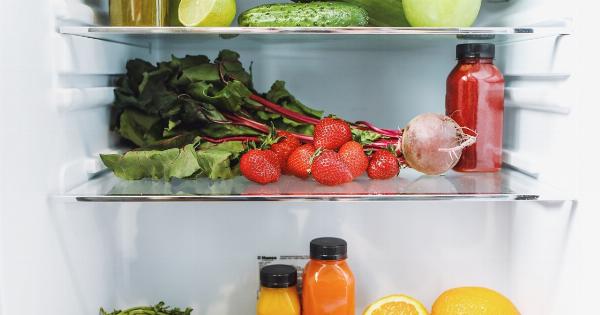Keeping your fruits and vegetables fresh for longer can be a real challenge, especially if you are trying to eat healthy and incorporate more of them into your diet.
Fortunately, there are a few simple tips and tricks that can help you extend the shelf life of your produce and keep it looking and tasting fresh for days or even weeks. Here are some of the best ways to keep your fruits and vegetables fresh longer in the fridge:.
1. Store Them Properly
One of the most important things you can do to keep your fruits and vegetables fresh is to store them properly.
This means keeping them in the right containers or bags, at the right temperature and humidity levels, and away from any other produce or foods that could cause them to spoil more quickly.
Generally, you want to keep your fruits and vegetables in separate bags or containers, as they require different humidity levels and temperatures. Here are some general guidelines:.
- Leafy greens: Wrap them in paper towels or a dry cloth and store them in a plastic bag with the air squeezed out; place them in the crisper drawer of your fridge.
- Berries: Store them in a single layer in a paper towel-lined container in the fridge; discard any moldy or overripe berries.
- Tomatoes: Keep them on the counter until they are ripe, then store them in the fridge; be sure to use them within a few days.
- Apples: Keep them in a paper bag in the fridge to slow down ripening; store away from other produce to prevent ethylene gas buildup.
- Carrots, celery, and other root vegetables: Cut off any green tops and store them in a plastic bag in the fridge.
2. Prep Them Ahead of Time
Another way to keep your fruits and vegetables fresh longer is to prep them ahead of time. This means washing, drying, and slicing or chopping them, as needed, before storing them in the fridge.
Prepping your produce ahead of time can help you save time and make it easier to eat healthy throughout the week. Just be sure to store prepped produce in airtight containers or bags and use it within a few days.
3. Avoid Damaged or Bruised Produce
When shopping for fruits and vegetables, try to avoid produce that is damaged or bruised. This can speed up the spoilage process and cause other produce to spoil more quickly, as well.
If you do end up with some damaged or bruised produce, use it as soon as possible or cut off the affected area before storing it in the fridge.
4. Use the Right Temperature and Humidity
Temperature and humidity are two key factors in keeping your fruits and vegetables fresh longer in the fridge. Most produce prefers a temperature range of 35-45°F and a humidity level of 85-95%.
Your fridge crisper drawers are designed to help you control these factors.
Typically, the high-humidity drawer is for produce that needs more moisture (like leafy greens and broccoli) and the low-humidity drawer is for produce that needs less moisture (like apples and citrus fruit).
5. Keep Produce Dry
Moisture can be a friend or foe when it comes to keeping your fruits and vegetables fresh longer in the fridge. Too little moisture can cause them to dry out, while too much moisture can lead to rot or mold.
To keep your produce dry, be sure to dry it thoroughly after washing it and avoid storing it in wet containers or bags.
6. Keep Produce Visible
Out of sight, out of mind is especially true when it comes to fruits and vegetables in the fridge. If you can’t see your produce, you’re less likely to use it before it goes bad.
One easy solution is to keep your produce in clear containers or bags and place them at eye level in the fridge. This will help you remember what you have on hand and encourage you to use it before it spoils.
7. Freeze Produce
If you have fruits or vegetables that you’re not able to use before they start to go bad, consider freezing them for later use instead.
Most produce can be frozen, although the texture and flavor may be compromised. To freeze produce, wash and dry it thoroughly, then slice or chop as needed and place it in airtight containers or bags.
8. Use Ethylene Absorbers
Some fruits and vegetables, such as apples, bananas, and avocados, produce a gas called ethylene as they ripen. This gas can speed up the ripening process of other produce and cause it to spoil more quickly.
To prevent ethylene gas buildup, consider using ethylene absorbers in your fridge. These small packets can help absorb the gas and extend the shelf life of your other produce.
9. Rotate Your Produce
Finally, it’s important to rotate your produce regularly to ensure that everything gets used before it spoils. This means using the older produce first and moving the newer produce to the back of the fridge.
By following these tips, you can keep your fruits and vegetables fresh longer in the fridge and make it easier to eat healthy every day.































